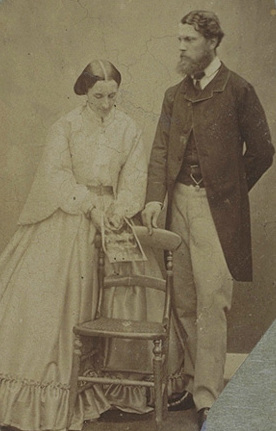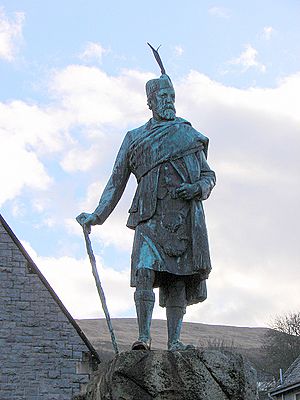Donald Cameron of Lochiel (1835–1905) facts for kids
Quick facts for kids
Donald Cameron of Lochiel
|
|
|---|---|

Lochiel with Viscountess Hawarden, 1861
|
|
| Lord Lieutenant of Inverness | |
| In office 1887–1905 |
|
| Preceded by | The Lord Lovat |
| Succeeded by | Alfred Mackintosh |
| Member of Parliament for Inverness-shire |
|
| In office 1868–1885 |
|
| Preceded by | Henry Baillie |
| Succeeded by | Charles Fraser-Mackintosh |
| Personal details | |
| Born |
Donald Cameron
5 April 1835 |
| Died | 30 November 1905 (aged 70) |
| Spouse | |
| Children | 4, including the 25th Lochiel |
| Parents | Donald Cameron, 23rd Lochiel Lady Vere Hobart |
| Residence | Achnacarry Castle |
Donald Cameron of Lochiel (born April 5, 1835 – died November 30, 1905) was an important Scottish leader and politician. He was known as the 24th "Lochiel," which means he was the chief of Clan Cameron in the Scottish Highlands. He was also a Conservative politician, a diplomat who worked with other countries, and served in the royal court.
Contents
Early Life and Education
Donald Cameron was the oldest son of Donald Cameron, the 23rd Lochiel. His mother was Vere Catherine Louisa Hobart. When he was born in 1835, people in the area of Lochaber were very happy. They held special dinners and lit bonfires on Ben Nevis to celebrate the birth of their chief's heir.
Donald went to Harrow School, a famous school in England. After finishing school, he began a career in diplomatic service, which means working for his country in other parts of the world.
His Career and Public Service
Donald Cameron started working for the Foreign Office in 1852. This office handles how Britain deals with other countries. He worked as a diplomat in Europe and even in the Far East. For example, in 1857, he was part of a special group that visited China. He also worked at British embassies in cities like Berlin, Berne, Copenhagen, and Stockholm. He stopped working as a diplomat in 1859.
In 1868, Donald Cameron was elected as a Member of Parliament (MP) for Inverness-shire. An MP is someone elected to represent their local area in the House of Commons, where laws are made for the country. He held this job until 1885.
He also served his local community in other ways. He was a Justice of the peace, which means he helped keep law and order. He was also a Deputy lieutenant for Inverness-shire and Buckinghamshire. From 1887, he became the Lord Lieutenant of Inverness-shire, a representative of the King or Queen in the county.
From 1874 to 1880, Donald Cameron worked for Queen Victoria as a "groom-in-waiting." This was a role in the royal household, meaning he helped serve the Queen. He had even hosted Queen Victoria at his home, Achnacarry Castle, in 1873.
Donald Cameron was also involved in sheep farming. When the sheep farming business faced tough times, he took on many of the sheep farms on his land. This gave him a good understanding of the challenges faced by shepherds. He also knew a lot about deer stalking. Because of his knowledge, he was asked to join important groups. In 1883, he joined the Napier Association, which looked into problems faced by farmers called Crofters. Later, in 1894, he was named to the Deer Forest Commission.
Family Life
In 1875, Donald Cameron married Lady Margaret Montagu Douglas Scott. She was the daughter of the 5th Duke of Buccleuch. Donald and Lady Margaret had four sons:
- Col. Sir Donald Walter Cameron (1876–1951), who became the 25th Lochiel after his father.
- Cpt. Ewen Charles Cameron (1878–1958), who was an officer in the Lovat Scouts.
- Allan George Cameron (1880–1914), who was killed during World War I.
- Archibald Cameron (1886–1917), who was also killed during World War I at the Battle of Arras.
Remembering Donald Cameron
Donald Cameron of Lochiel is remembered with a statue in Fort William. It was put up around 1905. The statue shows him in traditional Highland dress. There is an inscription in Scottish Gaelic that says: Dòmhnall Camshron mac Dhòmhnaill Dubh. This statue honors a man who served his local area of Lochaber and his clan throughout his life.
 | George Robert Carruthers |
 | Patricia Bath |
 | Jan Ernst Matzeliger |
 | Alexander Miles |


